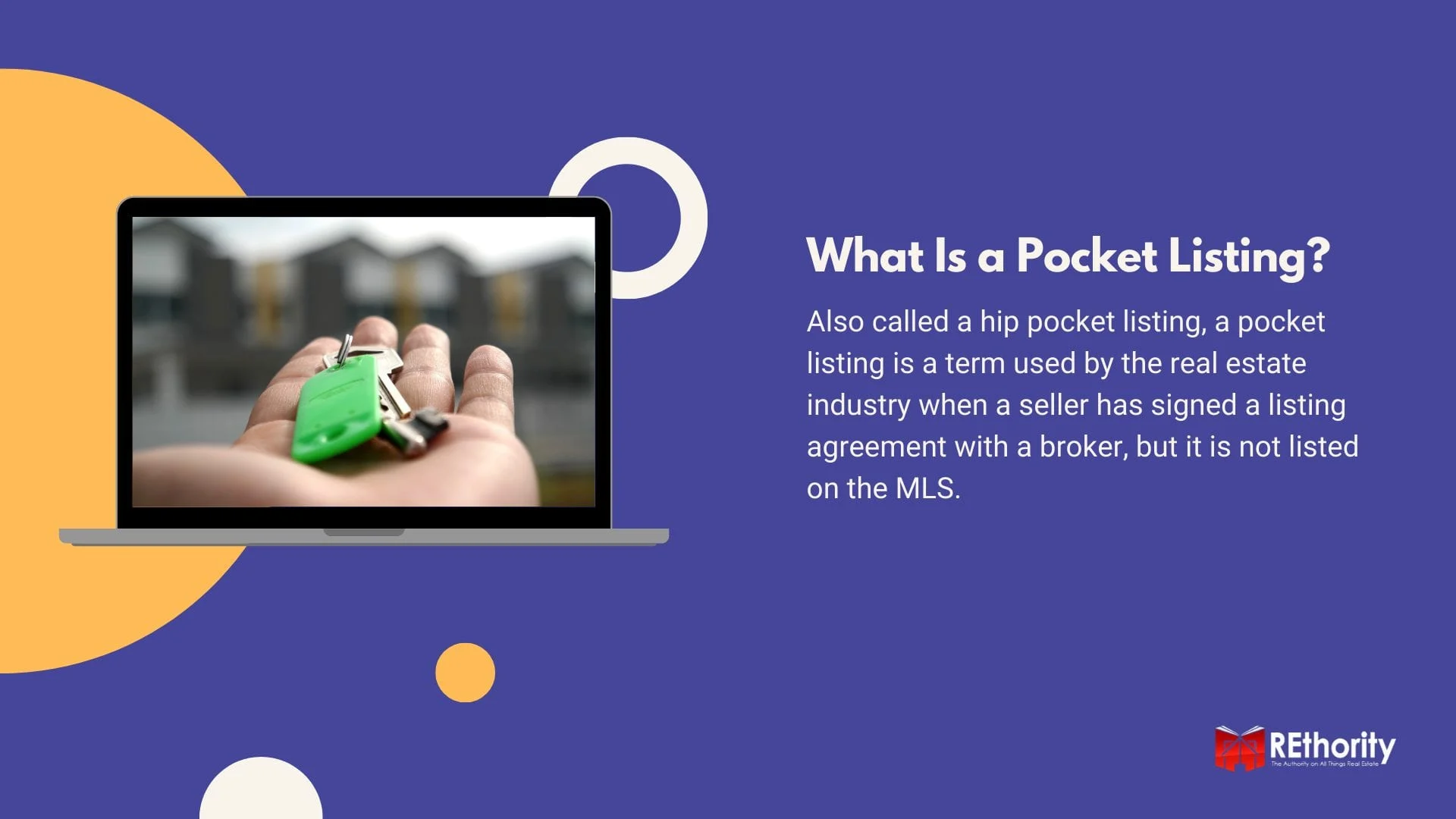Are you wondering, “What is a pocket listing?” If so, you can go to the right place.
Our complete guide breaks it down, including when it’s used and things to consider. Read on to learn all you need to know.
What is a Pocket Listing?
A pocket listing (also called a hip listing), is a term used by the real estate industry when a seller has signed a listing agreement with a broker but it is not advertised or included on the Multiple Listing Service (MLS).

This can be either an exclusive right to sell or an exclusive agency agreement with your real estate agent. Potential buyers won’t see a For Sale sign in the front yard, and buyers won’t find the property on listing services for clients.
Pocket Listings Explained
In the case of a pocket listing, the listing agent keeps the home in his or her “pocket.” They will only share the listing with a few trusted agents who may connect the right clientele to the property and have the seller’s best interests at heart.
Most estimates put these off-market listings at just 10 percent of all homes sold. So why would home sellers want to use pocket listings? We’ve broken it down below.
Traditional Vs Pocket Listings
Traditional real estate listings go up on the MLS and sites like realtor.com, where real estate professionals can browse options for their clients.
So, why is it that some sellers don’t want their homes exposed to the general public? There are a number of reasons. Sellers often use a pocket listing to:
Maintain Privacy

Sinart Creative/Shutterstock
This is the largest and most common reason. This is often the case for celebrities who don’t want their homes posted all over the internet, but there are other instances as well. For example, perhaps the homeowner has just gone through a divorce.
They may not want it to be public that they are selling. Or perhaps someone is relocating for better work opportunities. They wouldn’t want their current employer to know they were moving. This is also more common in high-end houses.
Wealthy homeowners may not want “looky loos” coming by to get a glimpse into how the other half lives. Instead of an open house, a pocket listing means each potential buyer coming to preview the home has already been vetted by a trusted agent.
Feel Out the Market

Rawpixel.com/Shutterstock
Some sellers want to get an idea of what their home might be able to sell for. They can get feedback from potential buyers. Then, when they’re ready to create an MLS listing, they’ll have a better idea of the best price.
This can also help the seller spend less time on the MLS. When a property has been listed for too long, buyers begin to wonder what is wrong with the property.
Push Homeowners to Sell

Roman Samborskyi/Shutterstock
Sometimes, a homeowner might not be quite ready to sell. If they encounter early interest, it can be the push they need to sell their home.
Save Money

Teerasan Phutthigorn/Shutterstock
Since an exclusive listing is in just one Realtor’s “pocket,” this can lower the overall commission cost. For listing agents, using pocket listings can maximize commissions.
This is because the sale stays within the listing brokerage. While the benefits are many, there are certainly some disadvantages to pocket listings.
Tip: Looking to save time or money selling your home? Read our guide on For Sale By Owner Homes to learn how.
Cons to Pocket Listings
While pocket listings offer great benefits, there are also a few key downsides. Of course, this can be said about virtually any topic. We’ve compiled some cons we think are important to consider.
Lower Selling Price

Pathdoc/Shutterstock
Since pocket listings intentionally limit the number of potential buyers, there is less likelihood that the property will see a bidding war. You might be missing out on a buyer who may pay more but isn’t connected with a real estate broker.
No Foot Traffic

Connel/Shutterstock
A no-for sale sign out front means you won’t get any walk-in traffic. That means no word-of-mouth marketing by neighbors and drivers who may know a friend or family member looking to buy.
Less Exposure

Garagestock/Shutterstock
Although limiting exposure is the purpose of a pocket listing, it can effect how fast the home sells. The MLS exposes listings to millions of potential buyers instantly.
You won’t have that benefit with a pocket listing, when realtors will need to work their connections and relationships over time. For listing agents, one con is that they have to spread the word entirely on their own.
There is no MLS or Zillow to do the work for you. That leaves a lot of pressure on the lister’s shoulders to sell the property. Still, the benefits far outweigh the extra legwork.
Illegal in Some Areas

Keyport/Shutterstock
Naturally, a pocket listing can result in a conflict of interest, so some states have banned them entirely. If you’re an agent seeking to use this method to drum up business, pay close attention to your local regulations.
How to Find Pocket Listings
If you’re a Realtor with good connections, capitalizing on pocket listings can be a great way to get around the competition. But since these properties aren’t advertised publicly, it’s all about who you know.
Open Your Rolodex
The best way to do this is to work on your connections. Also, partner with other real estate agents and create good relationships with agents in your community. Then they will keep you in mind for future sales.
Work With an Agent

Monkey Business Images/Shutterstock
If you’re a buyer looking to find pocket listings, you can work with reputable buying agents to find listings that aren’t advertised publicly. This can be a huge benefit since there is inherently less competition.
The best way to find one is to ask your realtor! Tell them you are interested in widening your search beyond the MLS. They can reach out to fellow agents to see if there are any great properties hidden on the market.
One disadvantage for potential buyers is that the seller may not be as motivated to sell. So they might be less willing to negotiate. This can vary by seller and his or her motivations for keeping the listing private.
Use a Service
You can also use the Pocket Listing Service. Playing on the MLS, “PLS” is a private membership site created by realtors to the stars. The PLS offers a private platform for agents to search for market opportunities.
Listers on the site can include as little or as much information about the property as they would like. Again, the idea is to vet potential buyers and keep listings private.
So, What Is a Pocket Listing?

Feng Yu/Shutterstock
In short, the biggest pro to pocket listing is privacy. The biggest con is that your home may not go for as much as possible if it were advertised more widely. For sellers who choose pocket listings, privacy is more important than price.
This is common among the rich and famous, but they aren’t the only ones who can benefit. Pocket listings are great for sellers hoping to preserve their privacy under any circumstance or for sellers who want to test the waters before diving into the MLS.

